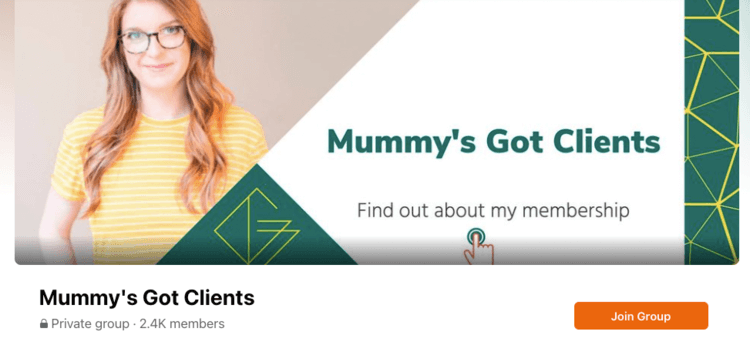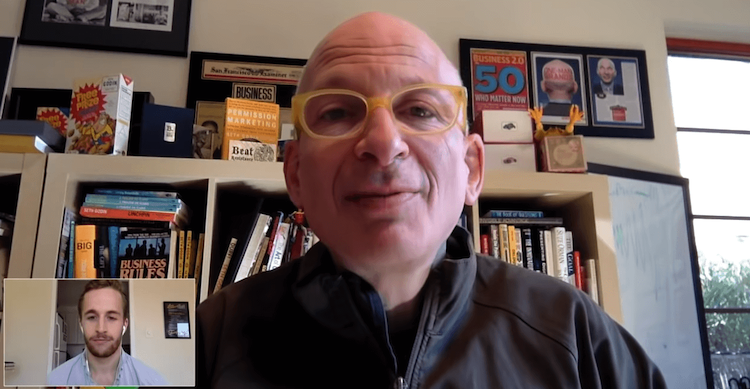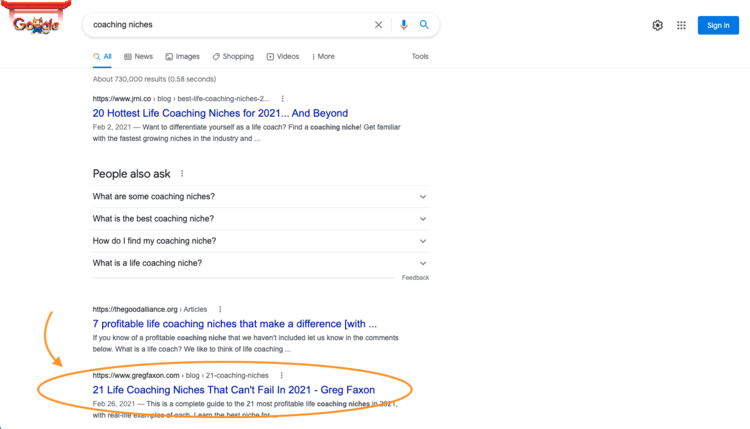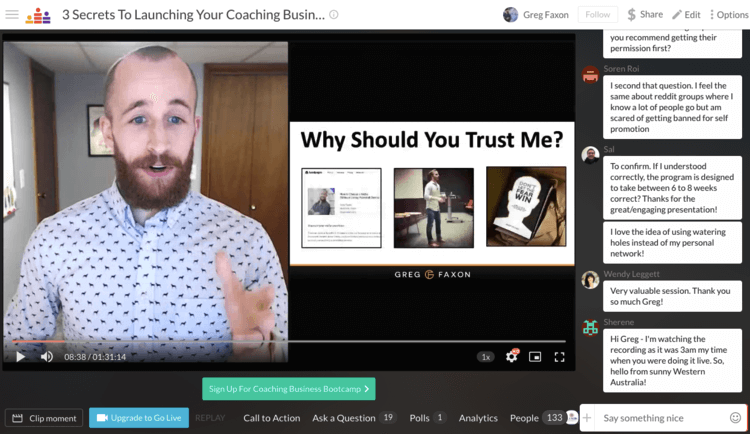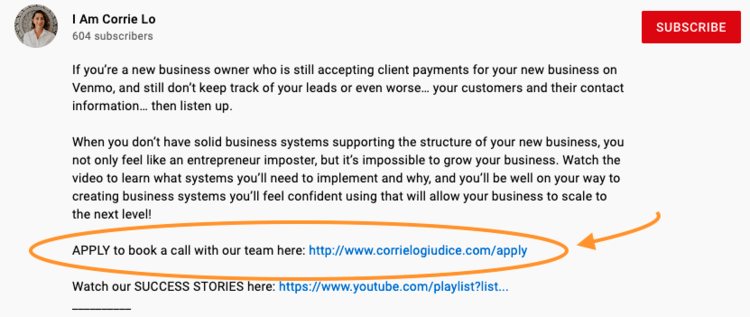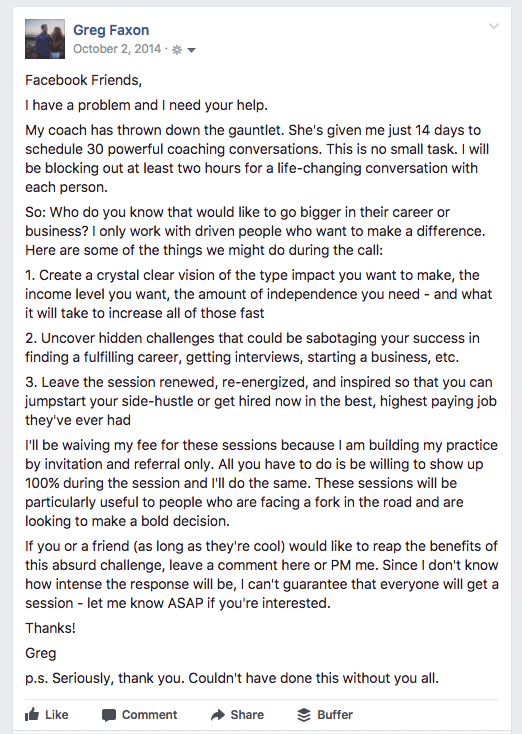Marketing For Coaches: The 10 Best Tactics, Broken Down By Personality Type
Ever wonder why certain marketing tactics work for other coaches…but not for you?
And you’re like…
“Do I suck at marketing?”
“Am I not working hard enough?”
“Did I forget to turn off the stove?”
It’s certainly possible.
But in most cases, you just need to stay true to your “Coaching Archetype.”
Here’s a video describing what I mean:
When you know your Coaching Archetype, getting clients is simple. You actually look forward to marketing because you’re playing to your strengths. This creates consistency. And consistency creates results.
When you don’t know your Coaching Archetype, getting clients is overwhelming. You feel pressured to try every new marketing tactic under the sun. You’re always jumping from tactic to tactic, not leveraging your strengths, and you end up with no clients.
In this article on marketing for coaches, I go into more depth on the three Coaching Archetypes and tell you which tactics to focus on. Jump to a section below…
Table of Contents:
Before we dive it, take my 4-question quiz to figure out your Coaching Archetype:
If you’re just starting out, I’d recommend reading my article on how to get your first three coaching clients. Then, once you’ve gotten your first few clients, come back here for a more nuanced approach.
One more thing…
The tactics below work best when you’ve figured out your coaching niche. If you’re not sure what yours is, here are the 21 most profitable coaching niches.
If you’ve already gotten your first few clients and you have a rough sense of your niche, let’s dive in. Here’s a visual representation of what we’re about to cover:
3 Types Of Coaches: Connectors, Mavens, Salespeople
Coaches come to me all the time asking where to find clients. There are many strategies that can work. But depending on their personality, some strategies will work better than others.
There are three types of coaches. Knowing your primary Coaching Archetype can help you play to your strengths and protect against your weaknesses.
🤝 Connectors get clients through relationships. They are natural hubs and love connecting with others. Connectors typically have a solid network that they can source clients and referrals from.
📕 Mavens get clients through content. They love breaking down complex topics and giving people shortcuts. The best marketing strategies for a Maven usually include some form of teaching.
💎 Salespeople get clients through charisma. They are also highly persuasive. Salespeople are able to build a strong personal brand through things like speaking, advertising, and live video.
Note: These “Coaching Archetypes” are based on Malcolm Gladwell's research in his book The Tipping Point. The book suggests that there are three types of people who help ideas spread. I've simply applied his research to the coaching industry and identified the best marketing strategies for each personality type. I also need to give credit to Charlie Gilkey and Pamela Slim for their related work on this.
Once you've discovered your Coaching Archetype, play to your strengths. Double down on the strategies that you are naturally good at. Then, partner up with coaches, contractors, or colleagues as needed to balance out your weaknesses.
How To Get Clients As A Connector 🤝
Connectors are on a mission to make a difference, and they believe that the best way to do that is through people. Connectors are natural hubs and love connecting with others. They often have strong networks that they can use to source clients and referrals.
Strengths: Caring, curiosity, and the ability to bring people together
Weaknesses: Developing and selling their own ideas
Popular Connectors: Lewis Howes, Jonathan Fields, Pamela Slim
Best Marketing Tactics: Networking, referral partnerships, and interviews
Here’s how to get clients as a Connector:
1. Attend Networking Groups (+ Create Your Own)
One of your strengths as a Connector is your ability to, well...connect with people.
You can take advantage of this by showing up in places and groups where your ideal clients already hang out.
This doesn't mean you should go to random networking events and just hand out business cards all day. Ain’t nobody got time for that.
Instead, I recommend signing up for paid events or retreats that cater specifically to your potential clients. If someone is willing to pay for an event or retreat, they’re more likely to invest in coaching.
Let’s say you’re a health coach for stressed-out overachievers. You’d probably find potential clients at a wellness retreat. You could also do your networking online. For example, you could answer questions in a Facebook group about intuitive eating.
Or, even better, you could curate your own group. For example, you could start your own Facebook group, meetup, or paid event. Some of those people will eventually hire you or refer you to their friends.
The best part about building your own group is that you’re at the center of it. That means people have to play by your rules. And you can promote your coaching as much as you’d like. This is what my client Gemma did:
My client Gemma Gilbert started her own Facebook group called "Mummy's Got Clients" and generated $40k in one month. Read the case study here.
It can take some time to build your own community, so I recommend attending other people’s networking groups in the meantime. A few of my Connector clients have had success attending BNI - a networking group based around giving referrals.
2. Build Referral Partnerships
One of the best ways to get clients as a Connector is to build relationships with people who serve your niche in a complimentary way.
You know how chiropractors often share an office with massage therapists? Why is that? Well, one reason is that it allows them to refer business to each other. They both serve people in pain, people who invest in bodywork. But the chiropractor and massage therapist aren't direct competitors.
My client Tamara helps business owners document their processes. Tamara got a ton of referrals from the employee training software Trainual. She grew her business by 277% over the 6 months that we worked together.
The ultimate version of this is when you can connect with one of the mega-stars in your niche and have them promote your work. Think about it like the “Oprah Effect” but on a smaller scale. Sometimes, you can even have referral partners share one of your free downloads with their audience and use it to grow your email list by hundreds of people.
I'm often asked whether you should provide some sort of payment for the clients that these partners send your way. I only recommend doing this if you want to have an official "affiliate" relationship with someone. For example, if you have a lower-end course and someone wants to sell it directly to their audience.
Incentivizing referrals can backfire. You want your partners to send you clients because they stand behind your work, not because they might get paid for it.
A better option is to reward referrals after they happen. Send the referrer a gift basket and a nice note. Then, make sure you keep that person updated when your client has a big win and continue to thank them for the referral.
More importantly, how do get these types of referrals in the first place?
It’s not just about doing quality work. Although that’s obviously important. Focus on these three things instead:
One of the best way to get referrals is to give them. Play the role of matchmaker and connect two people who would benefit from knowing each other. The more you expand your network, the easier it will be to do this.
Which brings us to our final tactic for Connectors…
3. Interview Top Experts In Your Niche
This can be a great marketing strategy for Connectors. One of your strengths as a Connector is your curiosity. Interviews are a great way to leverage that strength.
Everyone loves to be interviewed, so it gives you an “in” with people who you wouldn't otherwise have access to.
Take Lewis Howes, for example. He’s built massive audience simply by interviewing other experts. All of his marketing revolves around his top-ranked podcast, School of Greatness.
Here’s me interviewing Seth Godin for a podcast I did called The Bravery Project:
My interview with Seth Godin helped me build credibility in the marketing niche.
If you decide to start a podcast, I recommend reading this article on podcasting for business growth.
Another interview format to consider is the “round-up post.” This typically involves emailing lots of experts and asking them one specific question.
For example, I once wrote an article where I asked 27 expert coaches how they got their first three clients. Then, once the article went live, I sent them another email encouraging them to post it on social media. Finally, I held a live panel with a small subset of those experts. This allowed me to start building relationships with people like Michael Neill and Ajit from Evercoach. Here’s how to create a roundup post.
How To Get Clients As A Maven 📕
Mavens are a guiding light for others. They tend to be very skilled at their craft and they love teaching in a simple, step-by-step way. They aren’t afraid to give advice when they coach their clients.
Strengths: Expertise, synthesis, a focus on specific and tangible results.
Weaknesses: Imposter syndrome, spending too much time on research
Popular Mavens: Amy Porterfield, Eben Pagan, Greg Faxon
Best Marketing Tactics: Interviews, long-form content, and workshops
Here’s how to get clients as a Maven:
4. Get Interviewed On Other Podcasts
As a Maven, one of your strengths is in your expertise.
But it’s not enough to just gather information. You have to make it your own. Create new approaches for helping your potential clients. This novelty gives people hope, and makes them want to hire you.
For example, I’ve used this Coaching Archetype concept to help myself stand out among lots of different business coaches who are all teaching one specific formula to get clients (hint: it’s whichever one worked for them).
A lot of times, thought leadership isn’t about coming up with something from scratch. It’s about combining two or more unrelated things to create something new.
And here’s the cool part: You don’t have to publish a best-selling book, or put on a Tedx Talk, to become a thought leader. All you have to do is get interviewed on other people’s podcasts.
There are a few reasons why interviews work so well. First, you’re tapping into someone else’s audience in order to grow your own. Second, you can build trust very quickly through audio. Third, other people give you the questions and you get to focus on sharing your wisdom.
A podcast interview I did called “The 5 Laws of High-Ticket Coaching” has resulted in $37,000 of new client work in the last several months. Potential clients heard me on that podcast, got on my email list, and hired me. Here’s the interview:
There are companies that promise to get you placed on podcasts within your niche. But in my opinion, it’s not necessary to pay for this service - all you have to do is email the podcast host directly with an effective pitch.
What does an effective pitch look like? It’s all about making your idea as relevant as possible to the podcast you want to be on. If you’re targeting podcasts that serve your niche (you should be) this shouldn’t be difficult. I recommend listening to an episode or two, then sending an email to the host sharing what you liked and how your idea relates to that.
Make sure that when you do these podcast interviews, you give some sort of Call To Action at the end. You can either invite listeners to schedule a Strategy Session, or you invite them to opt-in for a relevant freebie on your site. I personally recommend the latter, because that way you can keep nurturing your potential clients if they don’t book a call right away.
If the thought of doing podcast interviews doesn’t get you excited, here’s another way to share your thought leadership:
5. Create Long-Form, Searchable Content
As a general rule, Maven's do best with longer forms of content that allow them to get “into the weeds.”
As a Maven, you are an information specialist. So try and synthesize your research into something that your potential clients can benefit from.
My blog post on coaching niches brings me most of my website traffic. It's very in-depth. It’s ranked #3 on Google. And it's something that my potential clients are already searching for.
There are three primary channels that lend themselves to long form content: YouTube, Blogging, and Podcasting.
What about social media marketing for coaches?
I usually steer Mavens away from relying too heavily on social media. There are exceptions, but social media generally doesn’t lend itself to long-form content.
The other problem with social media is that you have to keep “feeding the beast” — posting more content — in order keep your engagement high. This isn’t the case with strategies like SEO blogging, where you can publish and article once and keep getting traffic to it for years.
The key to making content marketing work for you is to start with what people are searching for. For example, SEO blogging starts with something called “keyword research.” This is where you figure out what phrases your potential clients are typing into Google, and then basing your article headline and content around that search term.
If you want to learn more, here’s an in-depth guide on keyword research.
6. Run Free Workshops Or Webinars
Mavens are great teachers.
As a Maven, you can leverage this strength by running workshops in person or online.
When you're putting on one of these workshops, be sure to highlight the key mistakes that your potential clients are making and explain why how your approach is better.
In other words, focus on what they should do and why, not necessarily on how to do it (that's what they'll learn when they hire you).
At the end of your workshop, invite your participants to book a complimentary call with you. Say, “If you want to talk about how to apply what you learned today to your unique situation, let’s hop on a call and create a game plan together.”
You might be thinking, “why not charge for these workshops?”
It’s a great question. You can absolutely offer paid workshops as one of your services, like my colleague George Kao. But I don’t recommend charging if your #1 goal is to get coaching clients.
Think about it: if the purpose of your workshop is to attract as many potential clients as possible, the best way to accomplish that is by making it free. That way you’ll get more registrants, which will lead to more paid clients on the backend.
When you charge for a workshop, you end up having to do a lot of marketing just to get people to attend. In some ways, it’s easier to get potential clients on a sales call than it is to get them to attend your paid workshop.
Instead, look up groups that serve your niche. Then offer to put together a free workshop for their audience. That way, they can promote the workshop for you and you can just focus on the presentation.
If you already have an email list, you can run a free workshop for them:
These days, I have an email list that I can promote my free webinars to. But my first three clients came from putting together a positive psychology workshop for an adult learning group (sort of like a Meetup group) that was regularly looking for new guest experts.
How To Get Clients As A Salesperson 💎
Salespeople have a unique combination of raw talent and charisma. Many of the biggest stars in the coaching industry are Salespeople. Their natural ability to persuade helps them build strong personal brands and even become niche celebrities.
Strengths: Influence, charisma, storytelling, and the ability to inspire others.
Weaknesses: Underweighting the importance of connections, too much sizzle and not enough steak
Popular Salespeople: Marie Forleo, Tony Robbins, Brendon Burchard
Best Marketing Tactics: Advertising, video content, and speaking
Here are the 3 best marketing tactics for Salespeople:
7. Create Advertising Campaigns
Salespeople know how to persuade.
This comes in handy on advertising platforms like Facebook and Instagram.
If your advertising doesn’t stand out, it won’t generate clients for you. So it’s really important to learn the basics of copywriting. Your goal with these ads isn’t necessarily to get more awareness for your business (a.k.a. “brand marketing”). It’s to get folks to take a specific action that ultimately leads to them hiring you (a.k.a. “direct-response marketing”).
Advertising is like a science experiment. You need to systematically and unemotionally test different variations and take an analytical approach. You’re playing with real money here and you need to know whether you’re getting a return on your investment.
There’s a lot to learn when it comes to advertising, but the good news is that it can be highly scaleable. I recommend learning the basics yourself and building a profitable sales funnel before handing your advertising off to a consultant or agency. That way, you’ll understand what works on a small scale before you delegate.
Advertising is a numbers game. The leads won’t be as “warm” as with other tactics, but if you’re able to get enough high-ticket clients to make your campaigns profitable, you’ll have something you can turn on and off like a faucet. When it works, it can be very powerful.
I recommend starting with a very simple funnel. Ideally one that you’ve already tested with free traffic. Advertise this proven “lead magnet” — a free personality quiz, cheat sheet, or checklist — and then automatically sending the people who opt-in to a thank you page that invites to apply for a Strategy Session with you.
One of your key strengths as a salesperson is...well, selling. You're naturally persuasive. So make sure that you're regularly inviting people to Strategy Sessions.
If you spend all of your time creating free content, and none of your time selling, you're leaving money on the table.
I recommend following up regularly with your email list — the people who didn’t initially take you up on the Strategy Session — and make another invite. Once you get them on the phone, you have a good chance of converting them into a client.
8. Harness The Power of Video
Salespeople do best when they are able to share their vibe and personality with potential clients.
You can technically do this through writing. But it's much easier to do through video. Especially live video.
Salespeople make others feel good. So use video to inspire and lead your potential clients.
Marie Forleo does a good job at this. Notice that almost all of her content is video-based. That's because people love watching her - she's funny, she's attractive, and she's good on the spot. Brendon Burchard is another example of a Salesperson who focuses on video.
If you’re a Salesperson, I recommend basing your entire content strategy around video if possible - go live on Facebook or Instagram, record videos for YouTube, or give TikTok a try.
One of the reasons that video works so well is that people get used to seeing your face online and they develop a relationship with you. That trust goes a long way when they’re finally ready to hire a coach.
Corrie Lo is a former client of mine who does a great job leveraging video. In the description of every YouTube video, she puts a link to her free quiz or her application page.
9. Land Speaking Engagements
Another strategy that works well for Salespeople is speaking. In a way, live video is just speaking using social media. But you can land in-person speaking events as well, or speak at online summits.
When we discussed strategies for the Maven, we spoke about running live workshops and webinars. The strategy is similar for Salespeople, except the focus of these talks will be less about information and more about inspiration. As a result, shorter speaking engagements are generally better for Salespeople. They don’t do quite as well with longer, teaching-style workshops.
Another difference between Mavens and Salespeople is that Salespeople often land paid speaking gigs with corporations, then offer coaching as an upsell.
If you go this route, I recommend watching my interview with Jason Connell:
Tactic #10 (Every Coaching Archetype Should Do This)
Most coaches think that in order to get clients, they need more exposure.
That may be true in the long term. And I’ve just taught you a number of ways to get that exposure, depending on your Coaching Archetype.
But you could probably get a new client this week, using the audience or email list you already have, by putting out a Strategy Session Invite (or “SS Invite” for short).
Basically, you offer to hop on a complimentary call with someone to discuss their situation and create a personalized strategy.
If you do this correctly, one out of three people you speak with will hire you to implement the strategy you discuss.
Think about it like dating. You can have the greatest network in the world. But if you never start actually going on dates, you're gonna stay single.
Most coaches do the business equivalent of staying home and watching Netflix, hoping someone proposes marriage to them.
Here’s the very first SS Invite I ever out put, back when I was a career coach:
If you’re a new coach, I recommend using this "free session" offer.
This isn’t a one-time deal. There are myriad ways to structure a SS Invite, as I’ve mentioned in some of the tactics above. You can use client case studies, storytelling, webinars, or simply offer to hop on a call with someone you meet at a networking event.
However you choose to do it, you'll want to include the following in each SS Invite:
Who it's for (and who it's not for)
What they'll get out of the session
How they can schedule a time with you
Over time you may decide to charge for these initial consults, but in general I’d recommend offering them for free. Doing this will lead to more money down the road when people become long-term clients.
There's a lot more I could teach you about what makes a compelling SS Invite, but the bottom line is this...
If you want more clients, have more conversations.
If you want more conversations, make more invites.
When you invite someone to a conversation, don't position it as a a sales call. Have the conversation feel valuable in and of itself.
The key point to remember is this: if you’re marketing coaching, all roads must eventually lead to a Strategy Session.
Incorporate this habit into your marketing and watch as the clients roll in.
The Bottom Line On Marketing For Coaches
Most articles about marketing for coaches are just a massive list of ideas. And it’s like, “Okay, that’s helpful, but which one should I start with?” Knowing your Coaching Archetypes solves that problem.
Getting clients shouldn’t be something you dread. It should be a natural extension of your coaching. By aligning with your Coaching Archetype, you build a more authentic business.
In fact, you can utilize your Coaching Archetype through every part of your business, not just the marketing part. Here’s a training I led for the ICF on how to do that:
As coaches, we’re always encouraging our clients to utilize their strengths. We should follow our own advice when it comes to the business side of coaching. In other words, we need to know ourselves before we can help others do the same.
Before you go, hit the yellow button below to figure out your Coaching Archetype:



